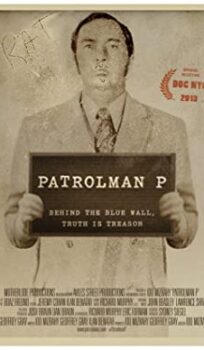Synopsis
POOPER:
Bill Phillips is paroled after 33 years in prison, and he is still trying to clear his name. The private investigators hired by the filmmaker cannot rule him out as the killer and won’t continue the investigation. To this day, the NYPD still considers him a rat for what he said to the Knapp Commission.
LONG VERSION:
Bill Phillips is a former New York City Police Detective who is serving a life sentence for a double homicide. Bill says that he was framed for the murders by the police as revenge due to his role in exposing corruption in the New York City Police Department.
In the early 1970’s, New York City’s Knapp Commission was set up to investigate charges of corruption made by another NYC Police detective, Frank Serpico. Detective Bill Phillips was caught red-handed taking a bribe, and the commission gave Phillips a choice: go to prison or help with the investigation. Phillips reluctantly agreed to wear a wire and recorded fellow officers talking about accepting bribes. When the Knapp Commission went public with it’s findings, they used the recordings made by Phillips as their proof. To disguise his identity, Phillips was identified only as Patrolman P. Later, Phillips was forced to come forward to publicly answer questions about the widespread graft inside the New York City Police Department. With his identity now known, Phillips and his family entered witness protection. As a result of the commission, new regulations were put in place to make policing more transparent, which would reduce or even eliminate corruption. But for Detective Phillips, all he got was an indictment for murder.
In the present day, the filmmaker, Geoff Gray, is wanting to reinvestigate the Phillips murder case, but he is having trouble finding cops from that era who are willing to talk about Phillips. He does recruit a husband and wife team of private investigators who are former cops to work with him, and together they go over the case against Bill Phillips. On Christmas Eve of 1968, a pimp who was unable to pay up was shot to death by an unknown assailant, who also killed a prostitute and wounded a john. The john gave a description of the shooter and a sketch of it was made, but the case quickly went cold. Three years later, the detective who was assigned to that case saw Phillips testifying before the Knapp Commission about shaking down pimps as part of the way they received bribes. The detective then realized that he closely resembled the killer from that cold case. Now facing murder charges, Phillips uses all of his life savings to hire renowned attorney F. Lee Bailey to defend him.
At the trial, Bailey was able to get the sole witness, the wounded john, to admit that the man he saw shoot the pimp and prostitute did not look like Phillips, but the case ended up with a hung jury. At the retrial, without Bailey as his lawyer, and despite witnesses claiming Phillips was not even in New York City at the time of the murders, Bill Phillips was convicted. With that conviction came the destruction of his credibility as a witness in the Knapp Commission, and as a result, all of the cases against cops indicted for bribery by the commission were thrown out. Years later, Phillips has become a jailhouse lawyer, helping fellow inmates in their appeals, usually with success. As for his case, an appeals court threw out the conviction after Phillips showed that the murder detective had bias against Phillips (his old partner killed himself after he believed he was taped by Philliips, and that detective wanted revenge). However, the Supreme Court overturned the appeals court decision.
With all of his appeals exhausted, and having been denied parole four times, Phillips knows that due to his declining health, his next parole hearing will probably be his last. He decides to admit to the murders, even though he says he didn’t commit them, in hopes that his remorse will allow him to be paroled. It works, and after 33 years in prison, Bill Phillips is a free man. But while Bill learns to live life in the 21st century, Geoff Gray and the PI’s continue to investigate the original murder case because Phillips wants his name cleared. However, during the investigation, the PI’s begin to suspect that Phillips may have indeed been the killer. That suspicion grows when they say Phillips is preventing them from talking to his ex-wife, who he says would testify that they were together on the night of the murders. They do convince him to take a polygraph test, but the results are inconclusive. Shortly afterwards, the PI’s tell Gray they will not continue the investigation and won’t return his calls.
At the end of the documentary, Gray (in a voice over) says that he has to distance himself from Phillips due to his other job as a crime reporter, so he won’t lose a potential source. To this day, the NYPD still won’t talk about Phillips, and still consider him a rat for what he said to the Knapp Commission. Title cards at the very end say that Phillips took another polygraph test and passed it. He lives in an apartment near his old prison under parole supervision and spends the day playing golf and working at a VA hospital. He still hopes to get his name cleared before he dies.

